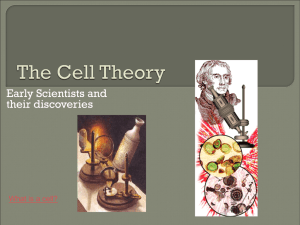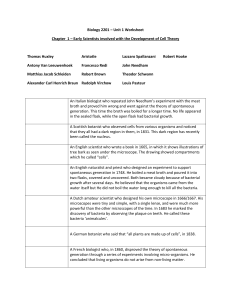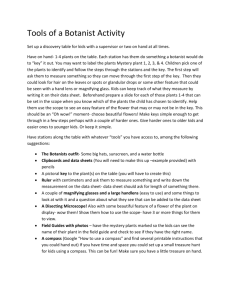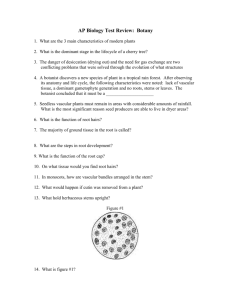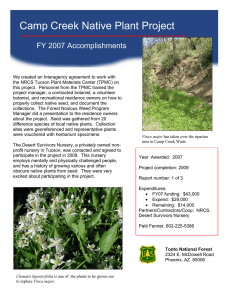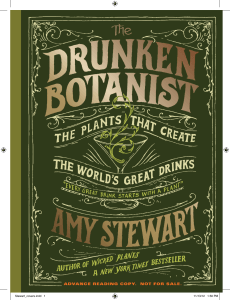JHC190_L202.doc
advertisement
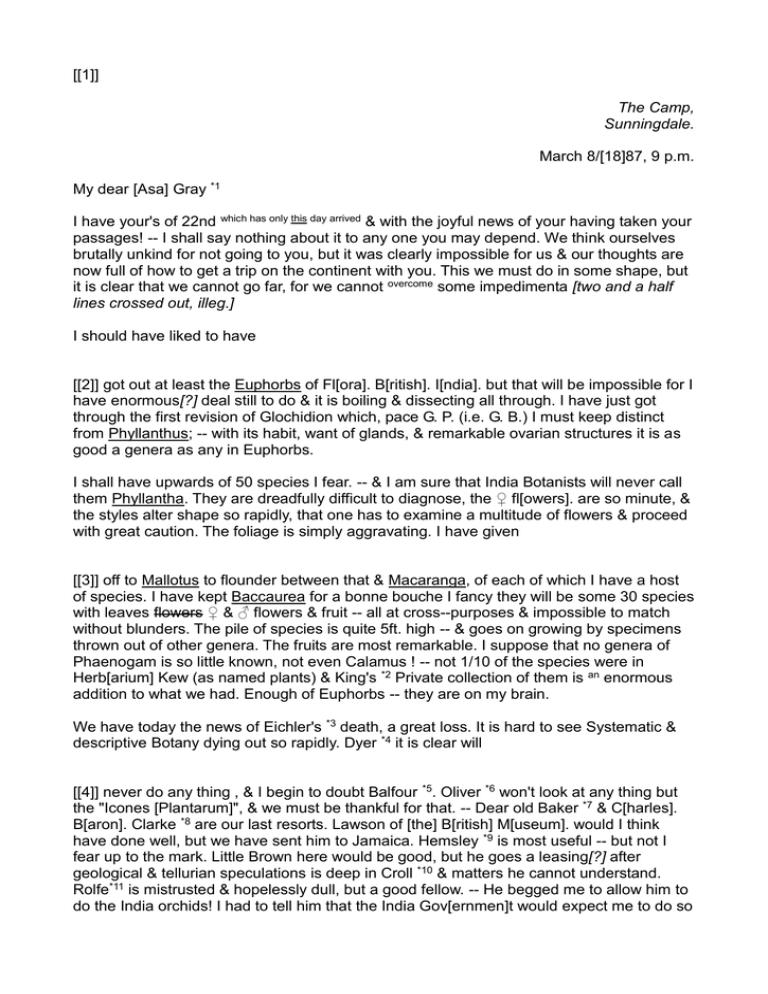
[[1]] The Camp, Sunningdale. March 8/[18]87, 9 p.m. My dear [Asa] Gray *1 I have your's of 22nd which has only this day arrived & with the joyful news of your having taken your passages! -- I shall say nothing about it to any one you may depend. We think ourselves brutally unkind for not going to you, but it was clearly impossible for us & our thoughts are now full of how to get a trip on the continent with you. This we must do in some shape, but it is clear that we cannot go far, for we cannot overcome some impedimenta [two and a half lines crossed out, illeg.] I should have liked to have [[2]] got out at least the Euphorbs of Fl[ora]. B[ritish]. I[ndia]. but that will be impossible for I have enormous[?] deal still to do & it is boiling & dissecting all through. I have just got through the first revision of Glochidion which, pace G. P. (i.e. G. B.) I must keep distinct from Phyllanthus; -- with its habit, want of glands, & remarkable ovarian structures it is as good a genera as any in Euphorbs. I shall have upwards of 50 species I fear. -- & I am sure that India Botanists will never call them Phyllantha. They are dreadfully difficult to diagnose, the ♀ fl[owers]. are so minute, & the styles alter shape so rapidly, that one has to examine a multitude of flowers & proceed with great caution. The foliage is simply aggravating. I have given [[3]] off to Mallotus to flounder between that & Macaranga, of each of which I have a host of species. I have kept Baccaurea for a bonne bouche I fancy they will be some 30 species with leaves flowers ♀ & ♂ flowers & fruit -- all at cross--purposes & impossible to match without blunders. The pile of species is quite 5ft. high -- & goes on growing by specimens thrown out of other genera. The fruits are most remarkable. I suppose that no genera of Phaenogam is so little known, not even Calamus ! -- not 1/10 of the species were in Herb[arium] Kew (as named plants) & King's *2 Private collection of them is an enormous addition to what we had. Enough of Euphorbs -- they are on my brain. We have today the news of Eichler's *3 death, a great loss. It is hard to see Systematic & descriptive Botany dying out so rapidly. Dyer *4 it is clear will [[4]] never do any thing , & I begin to doubt Balfour *5. Oliver *6 won't look at any thing but the "Icones [Plantarum]", & we must be thankful for that. -- Dear old Baker *7 & C[harles]. B[aron]. Clarke *8 are our last resorts. Lawson of [the] B[ritish] M[useum]. would I think have done well, but we have sent him to Jamaica. Hemsley *9 is most useful -- but not I fear up to the mark. Little Brown here would be good, but he goes a leasing[?] after geological & tellurian speculations is deep in Croll *10 & matters he cannot understand. Rolfe*11 is mistrusted & hopelessly dull, but a good fellow. -- He begged me to allow him to do the India orchids! I had to tell him that the India Gov[ernmen]t would expect me to do so important an order myself. The fact is I shall have to treat them in a very "broad spirit"). -e.g. to describe a dozen or two Dendrob[ium]s & for the rest -- say "D. xxx only differs from D. xxx in the blue lip" giving its citations &c. We are getting magnificent collections from interior of China. Sincerely Y[ou]rs | J. D. Hooker [signature] ENDNOTES 1. Gray, Asa (1810--1888). American botanist 2. Possibly King, Sir George (1840--1909) 3. Eichler, August Wilhelm (1839--1887). German botanist 4. Thiselton-Dyer, Sir William Turner (1843--1928). Botanist and Director of RBG Kew (1885--1905). 5. Balfour, Sir Isaac Bayley (1853--1922). Botanist. 6. Oliver, Daniel (1830--1916). Botanist. 7. Possibly Baker, John Gilbert (1834-1920). Botanist. 8. Clarke, Charles Baron (1832--1906). Naturalist. 9. Hemsley, William Botting (1843--1924). Botanist. 10. Croll, James (1821--1890). Geologist. 11 Rolfe, Robert Allen (1855--1921). Botanist . Please note that work on this transcript is ongoing. Users are advised to study electronic image(s) of this document where possible.
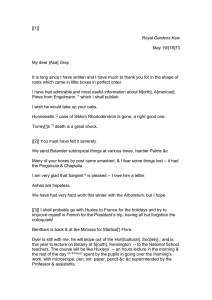

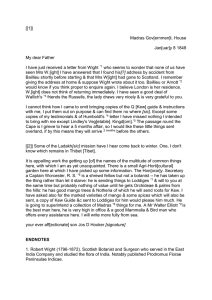
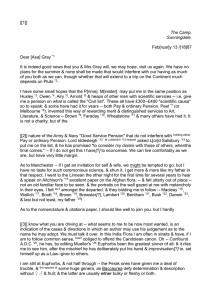
![[[1]] Parthia *1 July 8 / [18]77 Dearest Hyacinth *2 This we hope will](http://s3.studylib.net/store/data/007440000_1-29a15d718d157ac7b781767da7177d6f-300x300.png)
